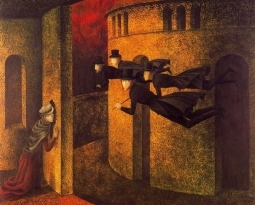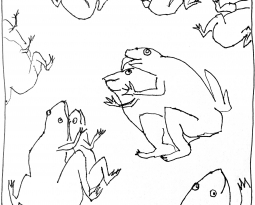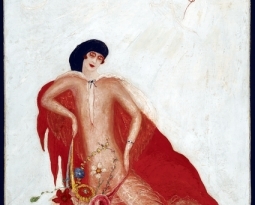64th Thread: Their plight benefits an evil man

When clicked, the image reveals the woman artist’s work that inspired it!
I resisted. I was so young, I did not know any better. I was furious to be ripped from my luxurious bed, my clothes, my toys, the people I knew. After having packed two small bindles, we went down the stairs on tiptoes, like thieves. Our jewels were hidden in our underskirts, jiggling at every step. A sentry, loyal to my mother, opened the side door for us. If he hadn’t consented, we would not have escaped, as she could not lift the bolt alone. I would have made a dishonorable marriage and kept my place amongst what is considered the finest.
We had never left the castle alone. After hesitating briefly, she grabbed me by the hand and started walking straight ahead. I was sure she didn’t know the way.
‘Mother, let’s go back. It’s so dark we will get lost.’
‘Hush. Salvation is ahead, not behind us.
We walked for hours, stumbling on rocks, slipping in the mud. At daybreak, we ran into a peasant who sold us his donkey for a fat handful of gold. His clothes were in disarray, his grey hair stood on his head, and he smelled of rancid lard. My mother asked him the way, to which he replied with garbled words, and vague, wide gestures. We had climbed on the animal’s back that he still stood counting and recounting the coins. We soon realized the donkey would not go anywhere my mother wanted. She had to get off and pull him by the reins. She shrieked and bleated, her face distorted with exasperation, as if she had turned into an animal of burden. I fell asleep.
 When I woke up, she was still tugging at the animal which was walking more steadily now. Her head was disheveled, her clothes covered in dirt, her feet bloody. I didn’t know she had that much courage and resilience in her. Finally, exhausted, hungry, we arrived at her father’s castle. He was less than happy to see us. As far as he was concerned, we should have stayed where we belonged. He treated us like servants. Our room bare of any comforts or ornaments. Our clothes became tattered without getting replaced or even patched. But my mother never complained. She strived to further my education, and spent long hours teaching me illumination and calligraphy, as well as music. It was time for me to get married. Grandfather allocated me a vineyard from which an exceptional wine is produced. There was a hefty price to pay. In exchange my mother had to give him most of her jewels, despite her pleas. He demanded that she renounce the inheritance of the castle, not only for herself, but for me, and my descendants. She had no choice or he would have put us out like beggars. I saw her wipe tears silently as she signed the deed. Less than a year later, I was married to your father. The vine was added to his estate. It goes from the little wall, up there, next to the pear tree, down to that line of thicket that lines the river. We made do, with his land and mine, until the plague struck again. So many of our serfs died, we could not take care of the domain. The grape rotted on its plant, the weeds invaded the furrows. I begged my cousin for help as my father had died. He closed his door. His manager offered to lend us gold with our best orchards as guarantee. We were obliged to accept. Without this sum, we could not have exploited our domain. The grain and wine brought in less than expected. We could not repay our debt. It’s the long, dismal story of how we have failed our heirs. We lost the orchards first, then most of the domain. My mother had opposed evil at the highest cost, with our circumstances greatly reduced. Meanwhile my cousin grew wealthier by taking more and more land from gentlemen who could not pay their laborers. This man, who had made a misery of my mother’s life, indulged in shameful revelry despite his age. He corrupted peasant women who, widowed, found themselves in need, forcing them to take part in orgies.
When I woke up, she was still tugging at the animal which was walking more steadily now. Her head was disheveled, her clothes covered in dirt, her feet bloody. I didn’t know she had that much courage and resilience in her. Finally, exhausted, hungry, we arrived at her father’s castle. He was less than happy to see us. As far as he was concerned, we should have stayed where we belonged. He treated us like servants. Our room bare of any comforts or ornaments. Our clothes became tattered without getting replaced or even patched. But my mother never complained. She strived to further my education, and spent long hours teaching me illumination and calligraphy, as well as music. It was time for me to get married. Grandfather allocated me a vineyard from which an exceptional wine is produced. There was a hefty price to pay. In exchange my mother had to give him most of her jewels, despite her pleas. He demanded that she renounce the inheritance of the castle, not only for herself, but for me, and my descendants. She had no choice or he would have put us out like beggars. I saw her wipe tears silently as she signed the deed. Less than a year later, I was married to your father. The vine was added to his estate. It goes from the little wall, up there, next to the pear tree, down to that line of thicket that lines the river. We made do, with his land and mine, until the plague struck again. So many of our serfs died, we could not take care of the domain. The grape rotted on its plant, the weeds invaded the furrows. I begged my cousin for help as my father had died. He closed his door. His manager offered to lend us gold with our best orchards as guarantee. We were obliged to accept. Without this sum, we could not have exploited our domain. The grain and wine brought in less than expected. We could not repay our debt. It’s the long, dismal story of how we have failed our heirs. We lost the orchards first, then most of the domain. My mother had opposed evil at the highest cost, with our circumstances greatly reduced. Meanwhile my cousin grew wealthier by taking more and more land from gentlemen who could not pay their laborers. This man, who had made a misery of my mother’s life, indulged in shameful revelry despite his age. He corrupted peasant women who, widowed, found themselves in need, forcing them to take part in orgies.
And yet this man escaped the plague. So did the blacksmith’s wife who beat her maid and her children, who stole tools from neighbors and abraded silver from the coins before she paid her debts. The midwife, caring for the poor from early morning to the dead of night, nevertheless succumbed. My mother was the last to go. We thought the epidemic was over when she took ill. Her face, pale and noble, was free to the end from the dreadful pustules. She died in my arms, without a single moan.
This is the 64th of 100 women who talk to their daughters over 2500 years. The 63rd mother rejects incest which was common in noble families to preserve their wealth. The 62nd mother hires a poetess to help them fight for their inheritance. The 61st woman was a warrior, as were a number of women throughout the Middle Ages and Renaissance. The 60th mother takes out her frustrated ambitions on her daughter. The 59th mother rewrites the 10 commandments for her child. The 58th mother does not take kindly to plucking her forehead. The 57th mother does not realize her husband is a swindler.
Before the Crusades:
The 56th woman is a powerful preacher, as was common in medieval times. The 55th woman was upset at her father’s trade. The 54th woman tells a fairy tale about aging. The 53rd woman, having climbed up socially, rejects her own mother. The 52nd woman‘s sister, a smart and lucky business woman, betters the fate of the daughter. The 51st woman leads the hard life of a hunchback. The 50th woman’s mind is as feeble as her back. The 49th mother explains why women should not fish. The 48th woman finds refuge in a fishing village. The 47th mother lulls her baby with an optimistic song. The 46th mother rebells against the wealthy.
It all starts here: first thread, and the last stories will take place in … present day America.





